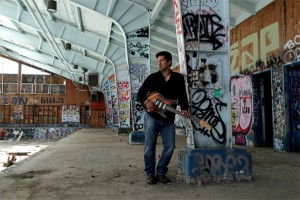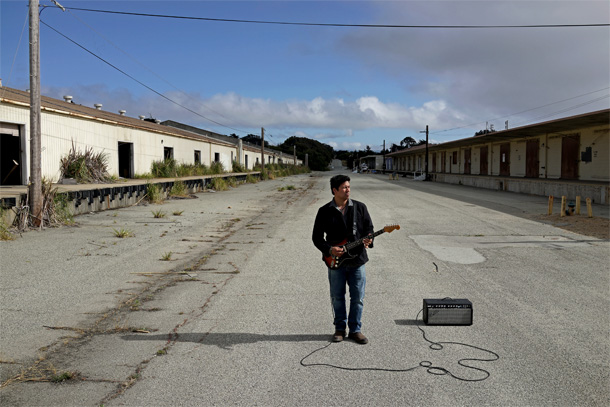Indigenous Interview: Mato Nanji
July 1st, 2013

Native American rocker Mato Nanji of the powerful blues group, Indigenous, began embracing the blues and utilizing his musical talent at a young age, as he was influenced heavily growing up by his blues musician father and his native culture. Now, with his 9th commercial record release, Vanishing Americans, Mato can be proven to practice what he preaches – hard work and sincerity certainly pay off in the music business, and yet, oftentimes, are the most difficult aspirations to hold on to. Jill Jacobs caught up with Mato as he was traveling in the mountains on the west coast for their current U.S. tour, during which Nanji discussed everything from the album process to inspiration to expert advice for an amateur music business dreamer and seeker.
Vanishing Americans is your 9th studio album. How is this album different from the others, and what did you do to prepare for this album?
It was one of the records I wanted to kind of pay tribute to my dad and my uncles and one of my cousins that all played in the Vanishing Americans, which was another group back in the late ’60s – early ’70s. They just influenced me a lot, even though I never got a chance to really see the band or go on to play or perform together or any of that, but people were out in the area that were in really, really good bands, so…[laughs.] And also that my dad was just, you know, my favorite musician, so he really influenced me a lot with everything. I just felt it was time to kind of pay tribute to him and the band. So that’s kind of how we got started, and I guess that was kind of the concept behind the whole record. At first I wasn’t really thinking about it; we just went in the studio and just started, you know? I just had a bunch of songs kind of ready to go and written and, after which, we recorded the record and stuff and that’s when we were kind of looking for album titles and, you know, just different things, and so that’s kind of how it came to be and I had to start thinking, “Well, yeah, that’d be cool,” [laughs.]
How would you say that your Native American culture impacts your music, as a songwriter and as a musician?
It is who I am, really, you know? I grew up on the reservation and so it’s kind of who I am, but I’ve always stepped outside of that because I’ve always felt like a lot of the stuff that goes on today is real contemporary and real stereotyped, which it is. I know a lot of people on the outside tend to think that’s it’s really who we are or what we are, but it’s not. I think a lot of it has really been made up over the years and a lot of the Native people start believing it themselves [laughs.] “Oh, yeah, yeah, cool…” You know? And then it just kind of becomes a commercial thing. But I can see that — it’s just a way for them to go out and make some money, that’s all, and everybody’s got stuff that they want to do. But as far as who I am…and that’s one of the reasons why I felt kind of a connection to the different kinds of music that is popular, because a lot of the music that is popular with Natives on the reservations is either like country music or…you go from country music to like, rap, or something. It’s like a big extreme. There’s no in-between, as much [laughs.] And so I think, for me, my dad listened to the kind of music that I’m into now because I grew up listening to like all those great bands from the ’60s, which there isn’t really anything like that anymore, like Santana, or Chicago, you know? Which, those guys are still out touring but they weren’t back then. There was just nothing like that. And so, I mean, I think that’s kind of where I drew from, like as far as music goes and everything, and of course, if I would write a song and do all that, it’s a piece of who I am. And if that’s who I am… you know, I’m an Indian; I’m Native…it basically comes out when I write a song.
What do you try to keep in mind while making a record?
You know, most artists probably have so much pressure to keep on trying to make a hit, but I don’t know if that’s going to happen every time. So I always look at it like, “I’m just going to make a good, full record.” Like the way they’ve always done it years ago. And I think that that’s really what it’s about [laughs.] That’s what I’m about, you know? [Laughs]
Where do you think the blues rock genre is headed? How is it evolving?
Well, I think everybody’s kind of having a tough time up there, you know? Because it’s not really like it used to be. Like when we put out our first record, our first CD, people were buying CDs like crazy. I mean, they still do, but it’s mainly just at the shows. Like when we go on tour, that’s where we sell the most CDs, I think. But now, it’s like all going to computers and digital and all that kind of stuff, so I think it really makes it hard for everybody, for all the musicians out there trying to work and tour and make music, and then they get a lot of music stolen from them. And I don’t think people realize that it’s really work, you know? It is a lot of work. I think people think, “Oh, it’s just…you know, they can just go out and do this and do that, you know. It should be free anyways!” [Laughs] But it takes a lot of work to do what you do and to travel and to be away from your family. You do what you got to do, you know? It is a lot of work and it’s a lot of pressure, and I think a lot of people don’t get that, or they don’t respect it. I guess I’d probably be kind of biased because I’m a musician, but I respect that all those guys work their butts off to create the music, to go out and be on the road all the time, working, and I think, you know, why not support them? And especially if you like what they do. I would think people would want to do that, would want to support them, would want to buy records, would want to go see them live, or whatever it is. It really does make a huge difference. But, you know, it’s cool. I’m sure we’ll just keep doing what we’re doing, you know? [Laughs] No matter what. Times are going to change, but I think for me, there’s always going to be those music fans that are going to want to buy music and want to come out and see the band or support the band, and they’re always going to be there.
What’s your next project?
I think right now we’re just working on trying to get our music over into other countries a little more and try to get over there to tour a little more. We’ve gotten a few things here and there but I think that’s kind of one of the things we’re trying to work on and trying to do, you know? Build it a little bit more internationally. We kind of just had a few shows here and there, but it’s kind of hard to find the right stuff. But that’s kind of what we’re doing. You also don’t want to go over there and not have any new music or new projects out, so that’s kind of one of the things that we’ve been running into. But if there’s any goal or anything in the future, that’s probably one of the main things. Get it known worldwide, you know? I mean, I really enjoy like touring here in America. I’m honored every time people make the trip out to come see us play live or they come out to buy a CD. I think it’s great. That’s inspirational right there for me. It makes me want to keep doing what I’m doing, writing and making music. Because that’s what a lot of the fans say – “Keep doing what you’re doing” [laughs.] And that’s pretty inspiring.
What’s your best piece of advice for someone looking to break into the music industry?
Geez, I don’t know [laughs.] It’s completely different from what I remember; it’s like a whole new world from when I started. It’s tough, you know? The only thing I can say is be true to who you are and what you’re going to do, or what you want to do. Basically, if you’re a songwriter, put your heart and soul into that. If you do that and you stay true to that, I feel like those fans are eventually going to come out and are eventually going to come see you. Just work hard, you know? It is a lot of work. Nobody knows that, but it is [laughs.] It’s got to be 150% work. And you’ve just got to be into it, I guess. And really love what you’re doing. And that’s the only advice I can put out there is that it’s really about what you want to do and who you are and what you feel. That’s what it’s always been about for me, I mean. I know people kind of get misguided by a lot of different things, but it’s really up to the artist and what they want to do and who they want to be, and they can do whatever they want to do, really. As long as you’ve got a feel and you’re putting everything into it, I really feel people will listen.
Interview by Jill Jacobs
*Photos: Bruce Haley

